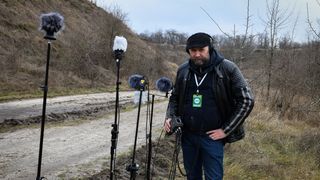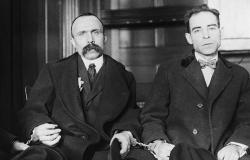For over two years, Ukrainians have been hearing the sounds of bombs, rockets, drones and sirens warning them of attacks almost every day. According to the researchers there, they are under the influence of acoustic terror, which the Russians are deliberately using here to break their morale.
“The impact of acoustic terror is extensive and long-lasting. We won’t get rid of it in the foreseeable future,” said Natalja Zubarová from the non-profit organization Maidan Monitoring Information Center, which has been dedicated to the phenomenon of acoustic violence for a long time, in an interview for Seznam Zprávy.
She lives alone in Kharkiv, which is under almost constant fire from Russia.
Some time ago – in collaboration with Professor Ihor Rusčenko, Associate Professor Ihor Dubrovský and researcher Serhij Petrov – they did a sociological survey. In it, they pointed out that constant exposure to the sounds of war can lead to chronic stress and a number of other health problems.
Already in her earlier works, Zubarova also emphasized that Russia terrorized Ukrainians with the help of sound even before it sent troops to their country – with its “intrusive and unpleasant” music, which was almost impossible to avoid in the streets of Ukrainian cities.
Could you start by explaining what acoustic terror is?
A type of terror that uses the impact of noise on people. Mass terror where people experience the effect of loud noises and shock waves.
It can be caused by the sounds of bombs, rockets, drones, but also the side effects of war, which we refer to collectively as the sounds of war. One of its examples is the sound of sirens, which is a direct result of attacks by Russia. It sounds very often in Ukraine. I’ve heard them three times today (we spoke about an hour before noon Ukrainian time, author’s note).
More on Acoustic Terror:
ANALYSIS. Long-term anxiety, chronic stress and other problems can be caused by the constant Russian sound terror in Ukrainians. “They hear garbage trucks driving by and think it’s shelling,” researcher Natalja Zubarová describes one of the effects.
The sounds of war have recently been joined by the constant hum of power generators in the streets. This is something new that we have not yet studied in our research – unlike the rest of the sounds. The generators are in operation due to power outages caused by the destruction of the energy infrastructure, and their sound is also very unpleasant.
What led you to start working on the topic?
The idea that Russia is using acoustic terror in Ukraine on purpose was instilled in us by foreign war reporters who arrived in Kharkiv at the beginning of a full-scale invasion of Ukraine. They told us that they experienced something similar in Syria and Iraq. Ukrainian journalists pointed out that it reminded them of tactics from the war in Chechnya.
Can you describe how Russia uses audio terror tactics in Ukraine?
Simply put, the point is that some bombs and rockets are fired at Ukraine not with the aim of destroying anything, but only to cause a lot of noise.
When (the Russians) hit a place on a hill, a large part of the city hears it. In addition, due to the location, the pressure waves propagate in such a way that people are unable to determine where it is coming from. They do not know how far from them the strike occurred and what else they can expect. It’s very scary.
Everyone who lives in Kharkiv has experienced something like this – during shelling, bombing and explosions.
The Russians are not very good at targeting, especially with missiles. They are currently testing a new type of gliding bombs that they drop from planes flying over Russia. They are not at all accurate and hit random, often densely populated areas. You guys are experiencing very serious cases of acoustic terror right now. With the new type of weapons, this terror increases.
Gliding bombs
What are the effects of acoustic terror?
It causes something that the leader of our research, Professor Ihor Ruschenko, refers to as projection syndrome, where any normal peaceful sound reminds people of the sounds of war. He hears garbage trucks driving by and thinks it’s shelling. The sound of the kettle reminds many of fighter jets flying over the city. It happens every now and then.
That’s something we’re currently working on. Before that, we did a pilot online survey where we asked people anonymously if they felt any effects of acoustic terror, if they felt scared and so on. This year we then received a smaller financial contribution from the Konrad Adenauer Foundation to do in-depth sociological research on the subject of acoustic terror during the war.
Sounds of war
“I was afraid of everything,” Ukrainian musician Denys Vasyljev describes his impressions of his trip abroad from Ukraine. He too has been experiencing Russian acoustic terror for over two years.

We conducted 31 in-depth interviews with people of different ages and genders who live in Kharkiv or have spent some time there and feel affected by acoustic terror. We also talked to several doctors. We are now evaluating the results.
Our understanding is that the most obvious impact of acoustic terror is that people experience chronic stress from which they cannot recover. Hypothetically, this can lead to a whole range of diseases – from worsening diabetes to intestinal disease and heart disease. However, it needs to be confirmed by another kind of research.
It is evident, however, that the impact of acoustic terror is extensive and long-term. We won’t be getting rid of him anytime soon. And that is why we want to formulate an amendment to the Ukrainian Criminal Code, which lists terrorism as one of the crimes. However, he mentions other types of terror, and we want the acoustic one to be added to them.
It is important, because in this way we can expand the number of those who have become direct victims of Russian aggression.
Do you notice any effects of acoustic terror on yourself?
Yes, sure. Especially now with the arrival of a new phase of war where we experience new types of sounds of war. I can’t tell what danger it poses. It makes me very nervous. And not only me. We constantly discuss this with other team members and volunteers.
Interview about the situation in Kharkiv:
“Kharkov is far from being uninhabitable. One or two hits a day will not make such a large city uninhabitable,” pointed out Natalja Zubarová in an interview for Seznam Zprávy.
According to her, however, there is a very nervous atmosphere in the city. “People are very tired. They constantly experience sonic terror,” she added.

The inability to determine what sound it is is, I would say, the worst. It is natural that one tries to find out what is happening, what kind of sound it is, where it is coming from. Not knowing is very unnerving.
There’s also a new type of sonic terror that requires the use of power generators. Their sound is really like torture. You’re walking down the street and suddenly you hear a sound made by dozens of them. You hear them all the time, you can’t avoid it. This builds tension.
I consider myself a very level-headed person, I’m trained for such things, but this upsets me.
In your earlier article you mention that Ukraine was under the influence of acoustic violence from Russia even before the full scale invasion of Ukraine broke out. How should we imagine it?
This was a very widespread practice of forcing loud sounds. It started already in the days of the Soviet Union, when trumpeters were installed in cities and villages that broadcast loud announcements. This type of violence was also used in prison practice where constant loud noises resulted in sleep deprivation.
Acoustic violence was commonly manifested in such a way that you could not avoid songs in Russian on the street. You went out and heard them in a coffee shop, on the bus, in the store, at music festivals, just everywhere.
How the Russian occupation transformed Crimea:
Posters with Russian President Vladimir Putin, Russian soldiers and the letter Z, but also homelessness and constant fear. Yalta native and activist Marija Suljalina describes Crimea after ten years of Russian occupation.

It should be mentioned that Russian music is very primitive. I certainly do not mean Tchaikovsky, but modern popular music with primitive lyrics. Most of them were songs that fall under the genre called Russian chanson. It’s similar in form to German hit songs, with gangster rap in content.
Such music just creates more noise. It is very intrusive and unpleasant. People can’t relax because of her, they can’t listen to the sounds of the city that are less annoying than this idiotic music. This can contribute to chronic stress and foster a culture of crime.
Can Ukraine itself do anything to minimize the effects of acoustic violence on its population? In your earlier article, you mention that it could introduce some noise control measures, such as penalties for loud music.
This is something we’ve been doing since before acoustic terror research. Our organization Maidan Monitoring Information Center started talking about the need to fight acoustic violence ten years ago. This includes loud music in public transport, in public places, in cafes and so on.
Even before the beginning of the full-scale invasion, as part of a campaign supported by a number of non-profit organizations, we managed to get a mention of acoustic violence into the Ukrainian criminal code and a ban on music in public transport. So when people want to listen to music, they have to put on headphones. That was just the first step.
How do young Ukrainians live?
Ksenia, Artem and Lyudmyla described how the Russian invasion changed their social life. While they used to frequent nightclubs, now they spend time with friends mainly at home. They also meet in cinemas and galleries, where they go to see Ukrainian culture.

The next step should be to regulate loud music in restaurants and similar places and offer an alternative – not so loud classical music or any music without words that has a calming effect. No comprehensive measures in this direction have yet been introduced, but a number of non-governmental actors are gradually adopting them on their own.
Activists from Kharkov, to whom Professor Ruschenko recently presented the results of the research, also came up with the idea of creating soundproof rooms where people could listen to the soothing sounds of nature. I think this is a good solution.
A program encouraging people to listen to classical music or music used in mindfulness practices could also be helpful. If their auditory senses were focused on something beautiful, soothing, it might help them cope better with the acoustic terror. Such measures could be included in the state mental health program led by First Lady Olena Zelenská.
Tags: Experience Ukraine Acoustic terror sound kettle remind fighter jets
-










